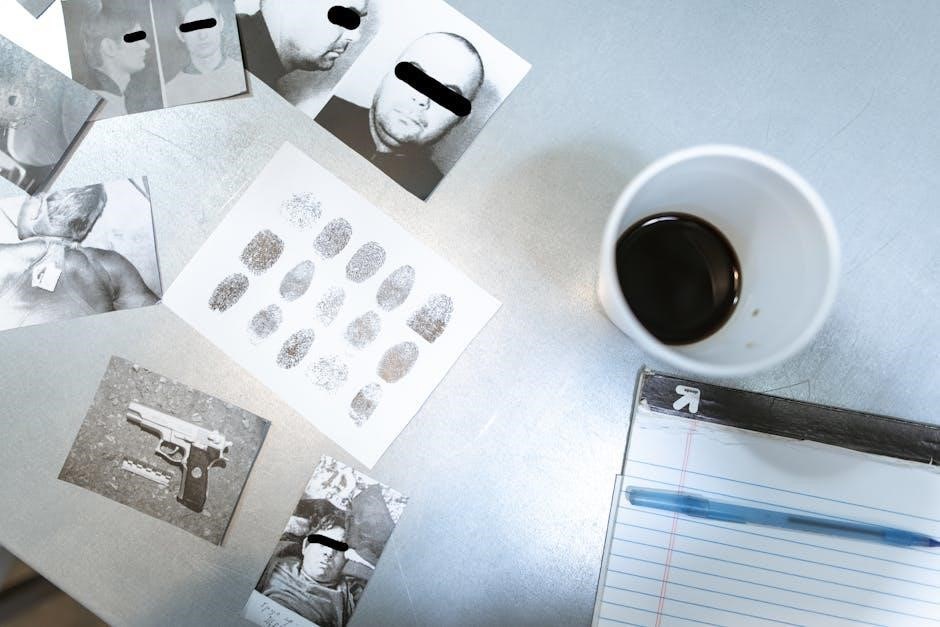Crime fighting psychology is the intersection of psychology and law enforcement, focusing on understanding criminal behavior, motivations, and patterns. It applies psychological principles to develop strategies for crime prevention, criminal profiling, and behavioral analysis. By analyzing human behavior, it aids in predicting criminal actions, enhancing investigative techniques, and ensuring safer communities through effective crime-solving methods.

H2: Fundamentals of Criminal Psychology
Criminal psychology, often referred to as forensic psychology, is the study of the mental processes and behaviors of individuals involved in criminal activities. It seeks to understand the motivations, thoughts, and actions of criminals to aid in crime prevention, investigation, and rehabilitation. This field combines psychological principles with legal frameworks to provide insights into criminal behavior.
At its core, criminal psychology examines why individuals commit crimes, focusing on factors such as biological traits, environmental influences, and psychological disorders. Theories like the Rational Choice Theory suggest that criminals weigh the potential benefits and risks of their actions, while others emphasize the role of upbringing, social environment, and mental health. By understanding these factors, criminal psychologists can predict behavior and develop strategies to deter criminal activity.
Key concepts in criminal psychology include criminal profiling, which involves creating psychological portraits of offenders based on crime scene evidence and behavioral patterns. This tool helps law enforcement narrow down suspects and anticipate future actions. Additionally, criminal psychology explores the psychological impact of crime on victims and society, informing support systems and policy-making.
The field also addresses the rehabilitation of offenders, focusing on interventions that address underlying psychological issues. Techniques such as cognitive-behavioral therapy aim to change harmful thought patterns and reduce recidivism rates. By integrating psychological insights into the criminal justice system, criminal psychology plays a vital role in creating safer communities and ensuring justice is served effectively.
Overall, criminal psychology provides a deeper understanding of criminal behavior, enabling law enforcement and policymakers to develop targeted strategies for crime prevention and rehabilitation. Its principles are essential for addressing the complexities of crime in modern society.

H2: Behavioral Analysis in Crime Fighting
Behavioral analysis is a cornerstone of modern crime fighting, offering insights into the motivations, patterns, and psychological profiles of criminals. By studying human behavior, investigators can predict actions, identify suspects, and solve crimes more effectively. This approach combines psychology, sociology, and criminology to understand the “why” behind criminal acts, enabling law enforcement to anticipate and prevent future offenses.
Key techniques in behavioral analysis include psychological profiling, which creates detailed portraits of offenders based on crime scene evidence and behavioral patterns. For instance, the Rational Choice Theory suggests that criminals weigh the pros and cons of their actions, helping investigators anticipate their next moves. Case studies, such as the Unabomber and the BTK Killer, highlight the power of profiling in identifying suspects and solving complex cases.
Advancements in technology, like predictive policing software, have enhanced behavioral analysis. By analyzing big data, law enforcement can identify crime hotspots and allocate resources more efficiently. This proactive approach not only reduces crime rates but also improves public safety. However, challenges remain, including potential biases in profiling and the need for ethical standards to avoid discriminatory practices.
Behavioral analysis has revolutionized crime fighting by bridging the gap between psychology and law enforcement. By understanding the science behind criminal behavior, investigators can develop strategies that address the root causes of crime, leading to safer communities and more effective justice systems.

H2: Crime Prevention Strategies
Effective crime prevention strategies are rooted in understanding human behavior and addressing the underlying factors that lead to criminal activity. Behavioral change techniques, such as addressing cognitive biases and improving emotional regulation, have proven successful in reducing criminal behavior. These interventions help individuals rethink their decision-making processes, consider alternative perspectives, and develop better judgment, ultimately leading to safer communities.
Environmental approaches are another critical component of crime prevention. By designing safer public spaces and implementing measures like improved lighting, surveillance, and community engagement, cities can deter criminal activity. Psychological interventions, such as counseling and rehabilitation programs, also play a vital role in reducing recidivism rates by addressing the root causes of criminal behavior.
Collective vigilance and self-defense training empower individuals to protect themselves and their communities. Programs that teach de-escalation techniques, physical defense, and the use of safety tools not only enhance personal safety but also deter criminals who prefer vulnerable targets. These strategies foster a sense of security and shared responsibility, creating an environment where crime is less likely to thrive.
Moreover, addressing socioeconomic factors and providing education and job opportunities can prevent individuals from turning to crime. By tackling the psychological and environmental drivers of criminal behavior, society can create a foundation for long-term safety and well-being. Crime prevention is not just about reacting to offenses but also about proactively building a resilient and supportive community.

H2: Forensic Psychology
Forensic psychology is a specialized field that bridges psychology and the justice system, focusing on understanding criminal behavior, motivations, and mental states. It applies psychological principles to assist in criminal investigations, legal proceedings, and the rehabilitation of offenders. Forensic psychologists use their expertise to analyze evidence, create criminal profiles, and provide insights into the psychological factors driving criminal actions.
One of the key roles of forensic psychology is in criminal profiling, where psychologists analyze crime scene evidence to develop a psychological portrait of the offender. This includes examining behavioral patterns, motivations, and potential triggers. Techniques like case linkage and cognitive interviewing further enhance investigative processes, helping law enforcement narrow down suspects and gather accurate witness testimonies.
Forensic psychology also plays a crucial role in legal proceedings. Psychologists assess the mental state of defendants to determine competency to stand trial or criminal responsibility. Their expert testimony can influence court decisions, ensuring that justice is served fairly. Additionally, forensic psychologists work with victims to understand the psychological impact of crimes and provide support during recovery.
Moreover, forensic psychology contributes to offender rehabilitation by identifying underlying issues that may lead to recidivism. Through psychological assessments and treatment programs, forensic psychologists help offenders address their behaviors and reintegrate into society. This holistic approach not only aids in solving crimes but also works toward preventing future offenses.

H2: Psychology of Criminals
The psychology of criminals delves into the mental processes, motivations, and behavioral patterns that drive individuals to commit crimes. It explores the psychological and social factors that contribute to criminal behavior, offering insights into why individuals engage in deviant acts. Criminal psychology examines the cognitive, emotional, and environmental influences that shape an offender’s mindset, helping to identify potential triggers and predictors of criminal actions.
Key theories in criminal psychology include the Rational Choice Theory, which suggests that criminals weigh the potential benefits and consequences of their actions before committing a crime. Psychological profiling is another critical aspect, where experts create detailed profiles of offenders based on crime scene evidence, behavioral patterns, and demographic data. These profiles help law enforcement narrow down suspects and anticipate future actions.
Understanding the psychology of criminals also involves analyzing their emotional states, such as empathy levels, impulse control, and susceptibility to external pressures. For instance, serial offenders often exhibit distinct psychological traits, such as a need for control or a lack of empathy, which differentiate them from other criminals. By studying these traits, psychologists can develop strategies to predict and prevent criminal behavior.
Real-life cases, such as the Unabomber Ted Kaczynski, highlight the importance of psychological analysis. His meticulous planning and targeted attacks were analyzed to build a psychological profile, ultimately aiding in his capture. Such examples demonstrate how criminal psychology bridges the gap between human behavior and law enforcement, providing actionable insights to combat crime effectively.

H2: Technology in Crime Fighting
Technology has revolutionized crime fighting by integrating advanced tools and data-driven insights into investigative processes. Predictive policing software, powered by behavioral analysis, identifies potential crime hotspots and anticipates criminal activities. This technology leverages historical crime data, environmental factors, and psychological patterns to guide law enforcement strategies effectively.
Big data analytics plays a crucial role in modern crime fighting. By analyzing vast datasets, investigators can uncover hidden patterns, track suspicious behaviors, and connect seemingly unrelated crimes. Tools like case linkage systems help identify serial offenders by matching modus operandi (MO) across different cases, enhancing the efficiency of investigations.
Artificial intelligence (AI) and machine learning algorithms are increasingly used to predict criminal behavior. These systems analyze psychological profiles, criminal histories, and environmental factors to assess the likelihood of recidivism or future offenses. AI-driven facial recognition and license plate readers further aid in identifying suspects and tracking their movements.
Digital forensics is another critical area where technology shines. Investigators use specialized software to recover deleted data, analyze digital footprints, and reconstruct criminal activities. This is particularly vital in cybercrimes, where understanding the psychological traits of hackers and online offenders is essential for developing effective countermeasures.
Despite its advantages, technology in crime fighting faces challenges. Issues like data privacy, algorithmic bias, and the need for ethical oversight must be addressed. However, the synergy between technology and psychological insights continues to transform law enforcement, enabling smarter, more proactive approaches to crime prevention and resolution.
By harnessing the power of technology, law enforcement agencies can stay ahead of evolving criminal strategies, ensuring safer communities and more efficient justice systems.

H2: Mental Health in Law Enforcement
Mental health is a critical yet often overlooked aspect of law enforcement; Officers frequently face high-stress situations, exposure to trauma, and the emotional toll of dealing with crime and violence. These factors can lead to conditions such as post-traumatic stress disorder (PTSD), anxiety, and depression, which can impair job performance and overall well-being.
The stigma surrounding mental health often discourages officers from seeking help. Many fear that admitting to psychological struggles could jeopardize their careers or be perceived as weakness. This culture of silence exacerbates the problem, leaving many officers to cope alone. Breaking this stigma is essential for fostering a supportive environment within law enforcement agencies.
Agencies are increasingly recognizing the importance of mental health support. Programs such as peer support groups, counseling services, and stress management training are being implemented to help officers cope with the psychological demands of their jobs. These initiatives aim to promote resilience, improve job satisfaction, and reduce the risk of burnout.
Leadership plays a vital role in promoting mental health within law enforcement. Supervisors who prioritize officer well-being and encourage open conversations about mental health can create a culture of trust and understanding. By addressing these issues, agencies can ensure that officers are mentally fit to perform their duties effectively and safely.
Ultimately, prioritizing mental health in law enforcement is not only beneficial for officers but also for the communities they serve. Healthy, well-supported officers are better equipped to handle the challenges of crime fighting, leading to improved outcomes and stronger public trust.

H2: Ethical Considerations
Ethical considerations play a pivotal role in crime fighting psychology, as the field often navigates sensitive areas such as profiling, privacy, and the potential for bias. Psychological techniques like criminal profiling, while valuable, raise concerns about stereotyping and discrimination. For instance, profiles based on race, gender, or socioeconomic status can lead to unfair targeting of specific groups, undermining justice and perpetuating inequality.
Another ethical dilemma arises from the use of psychological manipulation in interrogations. Techniques designed to extract information from suspects must be carefully balanced to avoid coercion or false confessions. Ensuring that methods respect human rights and adhere to legal standards is essential to maintaining the integrity of investigations and upholding the principles of justice.
Additionally, the application of behavioral analysis and predictive policing raises questions about privacy and individual freedoms. While these tools can help identify potential crime hotspots, they may inadvertently label innocent individuals as suspects based on statistical patterns rather than actual behavior. This highlights the need for transparency and accountability in how data is collected and used.
Finally, ethical guidelines must address the mental health of law enforcement personnel. The psychological toll of crime fighting can lead to burnout or unethical decision-making if not properly managed. Providing access to mental health resources and fostering a culture of support within agencies is crucial for maintaining ethical standards.
H2: Future of Psychology in Crime Fighting
The future of psychology in crime fighting is poised for significant advancements, driven by technological innovations and a deeper understanding of human behavior. As technology evolves, tools like artificial intelligence (AI) and big data analytics will play a larger role in predicting and preventing crimes. These technologies will enable law enforcement to analyze vast amounts of data, identify patterns, and anticipate criminal behavior with greater accuracy;
One promising development is the integration of AI-driven psychological profiling. By analyzing behavioral data, AI can create more precise and dynamic profiles of suspects, helping investigators narrow down leads and solve cases more efficiently. Additionally, predictive policing software, which uses behavioral analysis to identify potential crime hotspots, will become more sophisticated, allowing for proactive crime prevention strategies.
Another key area of growth is the use of virtual reality (VR) and simulation technologies for training law enforcement. These tools can simulate real-world scenarios, enabling officers to practice de-escalation techniques, crisis management, and psychological interventions in a safe environment. This will enhance their ability to handle complex situations effectively.
Moreover, the future will see a greater emphasis on mental health interventions within law enforcement. As the psychological toll of crime fighting becomes better understood, agencies will prioritize access to mental health resources and stress management programs for officers. This will not only improve job performance but also foster a more compassionate and ethical approach to crime fighting;
Ultimately, the future of psychology in crime fighting lies in the synergy between technology and human insight. By leveraging these advancements while maintaining ethical standards, law enforcement can create safer communities and address the root causes of criminal behavior more effectively.

H2: Conclusion
The role of psychology in crime fighting extends beyond individual cases, addressing broader societal issues such as crime prevention and rehabilitation. Programs aimed at reducing cognitive biases, improving emotional regulation, and enhancing decision-making skills have shown promise in lowering rates of criminal behavior. Additionally, the mental health of law enforcement officers has become a critical focus, ensuring they are equipped to handle the psychological demands of their roles effectively.
As technology advances, the future of psychology in crime fighting looks promising. Predictive policing, AI-driven profiling, and virtual reality training are just a few examples of how innovation is reshaping the field. However, ethical considerations must remain at the forefront to prevent biases and ensure justice is served fairly. By combining psychological principles with technological advancements, law enforcement can create a more proactive and compassionate approach to crime fighting.
Ultimately, the synergy between psychology and law enforcement is essential for building a safer society. By understanding the complexities of human behavior and leveraging psychological insights, crime fighting strategies will continue to evolve, leading to more effective solutions and a reduction in criminal activity;
